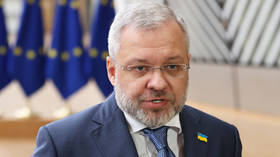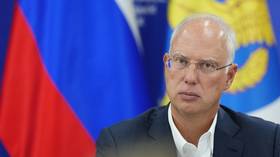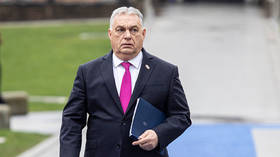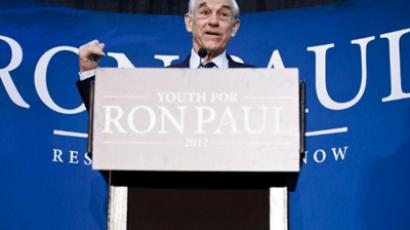NSA whistleblower supported Ron Paul’s presidential run
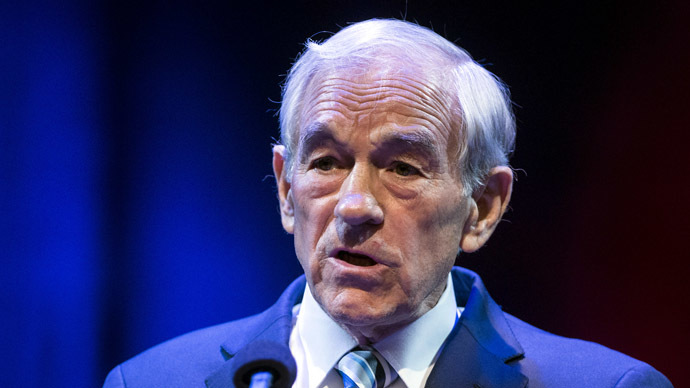
As news continues to surface about classified NSA documents leaked last week, the man who blew the whistle on the secret spy program is quickly becoming the center of attention.
Follow
RT's LIVE UPDATES on NSA leak fallout
With all eyes turned to 29-year-old Edward Snowden, the former CIA analyst who leaked documents about the National Security Agency’s domestic spying is already on his way to becoming the most discussed man in America. Less than 24 hours after the Guardian went public with Snowden’s identity on Sunday, the leaker’s personal life and politics have already taken center stage.
Now at the center of some discussions is Snowden’s endorsement of Ron Paul during last year’s presidential race, a revelation that is providing a rare glimpse into the ideologies of a man who will likely face decades in prison for going public.
According to donation info published by the Center for Responsive Politics’ website OpenSecrets.org, Snowden made two contributions totaling $500 to the presidential campaign of then-Rep. Ron Paul (R-Texas) during the last calendar year. Snowden made a $250 contribution to Rep. Paul on March 18, 2012, and another $250 donation on May 6.
Rep. Paul was vying for the Republican Party’s nomination as president during last year’s election, ultimately losing that slot to former Massachusetts governor Mitt Romney. Paul ended his active campaigning phrase shortly after Snowden’s second contribution was made and retired from Congress in early 2013 after serving decades on Capitol Hill.
Although other links between Snowden and Paul haven’t been published yet, the leaker did say in an interview this week that he supported a third party presidential candidate during the 2008 race that ultimately ended in a win for Barack Obama, a Democrat.
"A lot of people in 2008 voted for Obama. I did not vote for him. I voted for a third party. But I believed in Obama's promises. I was going to disclose it [but waited because of his election]. He continued with the policies of his predecessor,” Snowden told the Guardian.
Before Barack Obama won his bid for the White House in 2008, he campaigned on a promise of having the most transparent presidential administration in the history of the United States. Today his office continues to stand by that vow despite spearheading an unprecedented war against leakers. The Obama administration has so far charged seven people under the Espionage Act, and more leakers have been prosecuted under that legislation than by every previous president combined.
Snowden is reported to currently be in Hong Kong after fleeing his apartment in Hawaii at the beginning of last month. He previously worked for the Central Intelligence Agency (CIA) and, most recently, defense contractor Booz Allen Hamilton. He only worked there for three months before the Guardian published top secret documents last week about the NSA’s phone and Internet surveillance programs, operated for years under a provision of the Foreign Intelligence Surveillance Act and a well-hidden program called PRISM.
"The NSA has built an infrastructure that allows it to intercept almost everything. With this capability, the vast majority of human communications are automatically ingested without targeting. If I wanted to see your emails or your wife's phone, all I have to do is use intercepts. I can get your emails, passwords, phone records [and] credit cards,” Snowden told the Guardian.
"I don't want to live in a society that does these sort of things … I do not want to live in a world where everything I do and say is recorded. That is not something I am willing to support or live under."
Before the Guardian went public with Snowden’s allegations about the spy program — then later his identity — the leaker went to the Washington Post and asked them to publish his evidence of PRISM.
“Snowden asked for a guarantee that The Washington Post would publish — within 72 hours — the full text of a PowerPoint presentation describing PRISM, a top-secret surveillance program that gathered intelligence from Microsoft, Facebook, Google and other Silicon Valley giants,” Post reporter Barton Gellman admitted this week.
“I told him we would not make any guarantee about what we published or when,” Gellman recalled for the Post. According to Gellman, “The Post sought the views of government officials about the potential harm to national security prior to publication and decided to reproduce only four of the 41 slides.”
Snowden’s attempt to expose the secretive program through the Washington Post draws an eerie parallel to the case of Bradley Manning, the 25-year-old Army private who gave hundreds of thousands of sensitive government files to the anti-secrecy website WikiLeaks — but not before his phone calls to the Post and New York Times were ignored.
On the campaign trail last year, then-Rep. Paul said he’d protect Bradley Manning and other whistleblowers if elected to the White House.
“I maintain that government becomes more secret and the people’s privacy is being destroyed. We should protect the people’s privacy and we should make the government much more open,” Paul said last April during a campaign stop in San Antonio, Texas.
“I would certainly lean in the direction of protecting people that are trying to tell the truth,” said Paul. “The more openness the better. That’s what a free society is all about. It wouldn’t be so critical if the government was a lot smaller, but because it is so big it is big issue because there is so much that could be hidden.”




